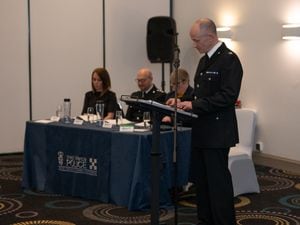Family issues appeal over Jason Pearce custody death
The family of a Shropshire man who died in police custody showing signs of a rare medical phenomenon known as "excited delirium" warned more people could die being detained unless more is known about the condition.

The family of a Shropshire man who died in police custody showing signs of a rare medical phenomenon known as "excited delirium" warned more people could die being detained unless more is known about the condition.
Jason Pearce, of St Georges, Telford, suffered a fatal heart attack in Sambrook Crescent, Market Drayton, on June 5 last year after being arrested and restrained by two police officers.
His family today issued a statement calling on the authorities to do more to prevent further lives being lost and said they believed more could have been done to save Mr Pearce's life.
Excited delirium has been cited as a possible cause of death in a number of cases from around the world in which people have suddenly died, often while in police custody.
Jason Pearce's uncle Dennis Pearce, of Wellington, said: "On behalf of the family, I wish to make the following statement following the inquest into the tragic death of Jason Pearce on June 5 2010.
"We fully recognise that drug toxicity played a key role in Jason's death and we understand and acknowledge that Jason chose to take drugs on that fateful day when he arrived in Market Drayton.
"As a family we have never attempted to defend such action as people must take responsibility for their actions in life.
"It is however regrettable that society generally views drug taking in a far more judgmental and intolerant way than, for instance, smoking and alcohol abuse.
"In our view, it is a feature of such intolerance that authorities and so called 'experts' either dismiss or ignore the associated risks with potential life threatening scenarios such as excited delirium.
"Home Office pathologists could not assess whether Jason died due to drug toxicity alone or excited delirium brought on by drug intake.
"For that reason, we do not oppose the cause of death as notified by the proceedings.
"It was, is and always will be the view of the family that more could have been done to prevent Jason's death, whether that be through proper recognition of the symptoms and potential life threatening effect of a potential excited delirium scenario and/or speedier action to summon medical assistance.
"West Mercia Police have recognised the failings in their training in the matter of excited delirium and there was clear dispute within that organisation as to whether attending officers had or hadn't received the requisite training.
"The operations training manger agreed, under cross examination, that their training was 'sub-optimal'.
"Our view is that proposed changes in training with regard to excited delirium will not prevent further tragedies.
"It is a matter of great sadness and concern to the family that matters of inadequate training and associated response were undermined by a clear lack of knowledge of excited delirium.
"In the view of the family, this was never better illustrated than by uncorroborated evidence that there is no medical treatment and that death is inevitable in excited delirium scenarios.
"We view that such evidence was deeply influential and damaging but crucially ill-informed and misguided.
"We further view that if such beliefs continue to prevail and are allowed to influence thinking, more deaths will ensue.
"In 2009, Kevin Huish , Police Federation of England and Wales lead on custody matters, wrote a paper called 'Hidden Dangers' on the matter of excited delirium.
"He wrote that 'the reality is that excited delirium is a serious condition that requires immediate medical intervention in order to save the subject's life' further adding that 'we may probably have had some deaths where excited delirium could be suspected and be a major contributing factor but there are real difficulties in knowing for sure. This is mainly due to a lack of knowledge, understanding and even existence of excited delirium within the British medical profession'.
"Kevin Huish further produced a conference report having attended a sudden death and excited delirium in custody death conference and wrote that 'there is clear lack of knowledge, experience, acceptance and understanding of excited delirium in policing and medical circles within the UK'.
"Sadly, it seems from the evidence heard during the inquest, there has been no major advance on this matter. "He also cited the acceptance of excited delirium by the American College of Emergency Physicians (ACEP) as 'a major step forward'.
"The ACEP have written that an estimated eight to 14 per cent of patients who experience excited delirium have died therefore indicating a survival rate of between 86 and 92 per cent.
"Crucially, the inquest heard 'heresay' evidence that is contradicted by the ACEP.
"The American and Canadian authorities are far more advanced in dealing with excited delirium, indeed the Institute for Prevention of In-Custody Deaths (IPICD) and the organisation for excited delirium provide detailed forensic, pathological and law enforcement guidelines advising excited delirium is a medical emergency.
"The IPICD provide details of medical assistance, inclusive of medication, that can save lives.
"American and Canadian experts argue that restraint is a major contributory factor and that containment is preferable further advising that excited delirium is not a police issue but a medical emergency requiring police support.
"As a family, we are unable to prove that different action by West Mercia Police would have saved Jason's life but neither, we believe, can anyone actually prove differently.
"Regrettably, in our view, it will take further deaths in police custody and potentially the death of a high profile or celebrity family member in order for UK authorities to deal properly with this matter.
"We believe that there must be a Home Office committee involving police and medical authorities to investigate the potential of this condition, a view supported by the Police Federation and we will be campaigning our local MP.
"However, the family now wishes to move on and be allowed to properly grieve, a process that has not been possible for over 12 months."





